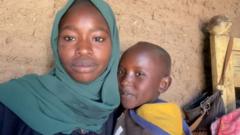Will Sudan's Besieged City Escape Starvation? UN Sounds Alarm

Understanding the Humanitarian Crisis in El-Fasher, Sudan
The situation in El-Fasher, a city in Sudan's western Darfur region, has reached a critical juncture. The United Nations World Food Programme (WFP) has raised alarms about the potential for starvation among families trapped in this besieged urban area. With nearly 250,000 residents, El-Fasher is surrounded by paramilitary forces from the Rapid Support Forces (RSF), effectively cutting it off from essential food supplies for over a year. This dire scenario is a direct consequence of the ongoing civil war that erupted in April 2023, which the UN describes as the world's worst humanitarian crisis. As local activists report deaths due to starvation, understanding the factors contributing to this catastrophe becomes crucial.
The Context of the Humanitarian Crisis
Sudan's civil war has severely impacted the lives of millions. The conflict, primarily between the Sudanese army and the RSF, has resulted in widespread violence, destruction, and displacement. As the war continues, it has created a ripple effect, leading to severe food shortages, skyrocketing prices, and the collapse of local economies. The WFP's inability to deliver food aid to El-Fasher highlights the dire need for humanitarian assistance. Without immediate intervention, the future of the city's residents hangs in the balance.
El-Fasher: A City Under Siege
El-Fasher, the capital of North Darfur, has been under siege for nearly 16 months. The RSF's control over trade routes has exacerbated the already precarious situation. Families in El-Fasher have resorted to desperate measures, including consuming animal fodder and food waste. This survival instinct, however, is not sustainable and underscores the urgency for a coordinated humanitarian response. The WFP's regional director for Eastern and Southern Africa, Eric Perdison, has voiced his concerns, stating that the coping mechanisms of the local population have been exhausted.
The Role of the World Food Programme
The WFP is at the forefront of efforts to address food insecurity in regions like El-Fasher. The organization has expressed its readiness to dispatch trucks loaded with food and nutritional assistance, contingent on guarantees for safe passage. However, previous attempts to deliver aid have been thwarted by violence. The UN's call for a humanitarian truce reflects the organization's commitment to ensuring that aid reaches those in need.
Challenges in Delivering Humanitarian Aid
Delivering humanitarian aid to conflict zones like El-Fasher presents numerous challenges, including:
- Security Risks: Humanitarian convoys face the threat of attacks, as seen in the WFP's June convoy that was ambushed.
- Access Restrictions: The RSF's blockade of trade routes has rendered the delivery of essential supplies nearly impossible.
- Political Instability: The ongoing civil war creates an unpredictable environment for humanitarian operations.
These challenges highlight the complexity of providing aid in regions afflicted by conflict and the necessity for international cooperation and dialogue.
The Human Cost of the Conflict
The toll of the civil war on the civilian population is staggering. Reports indicate that over 150,000 people have died since the conflict began, with approximately 12 million displaced from their homes. The humanitarian crisis in El-Fasher is emblematic of this broader tragedy, where families face starvation and violence daily. The heartbreaking accounts of children like Sondos, who fled the city with her family, bring to light the human suffering that often gets lost in political discourse.
Voices from El-Fasher
The stories of individuals trapped in El-Fasher provide a poignant reminder of the human element behind the statistics. Sondos's account of living in fear of shelling and going hungry underscores the urgent need for assistance. Such testimonies illustrate the resilience of those affected, as well as their desperate situation. It is critical to amplify these voices to ensure that the plight of El-Fasher's residents is not forgotten.
Deteriorating Living Conditions
As the situation continues to worsen, living conditions in El-Fasher have deteriorated significantly. Key challenges include:
- Food Insecurity: Families are struggling to find sufficient food, leading to malnutrition and starvation.
- Healthcare Access: The conflict has disrupted medical services, leaving many without access to essential care.
- Displacement: Many residents have been forced to flee their homes, compounding the humanitarian crisis.
This combination of factors creates a perfect storm, making it increasingly difficult for residents to survive.
The International Community's Response
The international community has a crucial role to play in addressing the humanitarian crisis in El-Fasher. Diplomatic efforts, humanitarian aid, and pressure on conflicting parties to allow the delivery of aid are essential components of a comprehensive response. Engaging regional actors and leveraging international platforms can help bring attention to the situation in Darfur, potentially leading to more effective interventions.
The Importance of Humanitarian Aid
Humanitarian aid is not merely a stop-gap solution; it is a vital lifeline for those affected by conflict. The provision of food, medical assistance, and shelter can significantly alleviate human suffering. Moreover, sustained humanitarian efforts can contribute to stabilizing regions affected by war, ultimately fostering peace and recovery. The WFP's commitment to delivering aid underscores the importance of international support in addressing humanitarian crises.
Potential Pathways to Recovery
While the situation in El-Fasher is dire, there are potential pathways to recovery that can be explored. These include:
- Negotiated Ceasefires: Engaging in dialogue to establish ceasefires can create opportunities for humanitarian access.
- Strengthening Local Governance: Empowering local authorities can enhance coordination and delivery of aid.
- Fostering Economic Resilience: Initiatives aimed at rebuilding local economies can help communities recover in the long term.
These pathways require commitment from both local actors and the international community. Only through collaborative efforts can the cycle of violence and deprivation be broken.
FAQs about the Humanitarian Crisis in El-Fasher
What is the current situation in El-Fasher, Sudan?
The situation in El-Fasher is critical, with families facing starvation due to prolonged sieges and conflict. The WFP has been unable to deliver food aid to the city for over a year.
How has the conflict in Sudan impacted food security?
The ongoing civil war has disrupted trade routes, leading to severe food shortages and skyrocketing prices in El-Fasher. Reports of starvation and malnutrition are widespread.
What are the challenges faced by humanitarian organizations in Sudan?
Humanitarian organizations face significant challenges, including security risks, access restrictions, and political instability, which hinder their ability to deliver aid effectively.
What is being done to address the humanitarian crisis in El-Fasher?
The international community, including the WFP, is advocating for humanitarian access and ceasefires to allow aid to reach those in need. Diplomatic efforts are crucial for a coordinated response.
Conclusion
The humanitarian crisis in El-Fasher is a stark reminder of the consequences of prolonged conflict. As families continue to face starvation and violence, the need for immediate action is more pressing than ever. The international community must step up its efforts to provide humanitarian assistance and work towards a sustainable resolution to the conflict. The stories of resilience and suffering from El-Fasher should galvanize action, ensuring that the plight of its residents is not overlooked.
How can we ensure that the voices of those affected by the crisis in El-Fasher are heard and addressed in global discussions? #SudanCrisis #HumanitarianAid #ElFasher
Published: 2025-08-04 05:18:08 | Category: world



